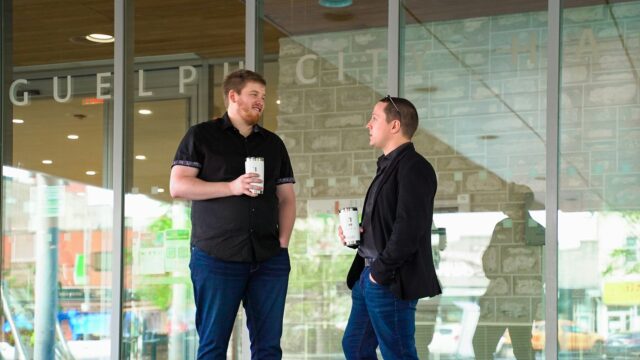You don’t need a Mensa membership or a PhD to be highly intelligent.

In fact, your everyday language may be revealing your mental superpowers without you even realising it. The words and phrases you use can offer a peek into how your mind works and how you process the world around you. If you catch yourself regularly using these 15 expressions, chances are you’ve got some serious brainpower bubbling under the surface. Give yourself some credit — you’re one sharp cookie.
1. “That’s a great question. Let me think about that.”

Lesser minds bluster through with half-baked opinions, but truly intelligent people take a beat to ponder and formulate a thoughtful response. They know the value of really considering a query before spouting off. By acknowledging the merit of the question and taking time to contemplate, they show respect for the asker and the conversation. They’re not afraid to sit with an intellectual challenge and give it proper consideration before contributing their two cents. Rushed answers are rarely the best answers.
2. “I’m not sure, but that’s an interesting idea. Tell me more.”

Smart people are perpetually curious and always eager to learn from other people. Rather than pretending to be an expert on everything, they’re quick to admit when a topic is new to them. But instead of tuning out or changing the subject, they lean in with genuine interest. They invite the other person to elaborate and share their knowledge. They see every conversation as an opportunity to gain a fresh perspective and expand their understanding. Intellectual humility and openness are hallmarks of true intelligence.
3. “Let’s look at this from another angle.”
 Source: Unsplash
Source: Unsplash Intelligent minds are nimble and flexible. They don’t get stuck in a single track or perspective. If they’re tackling a problem or analysing an issue, they’ll typically examine it from multiple angles to arrive at the best solution. They might play devil’s advocate, consider opposing viewpoints, or search for unlikely connections. By actively looking for new perspectives, they expand their options and avoid blind spots. Mental agility is a key component of high-level thinking and problem-solving.
4. “I used to think X, but now I’m reconsidering that position.”
 Source: Unsplash
Source: Unsplash It takes intelligence and maturity to change your mind. Less sophisticated thinkers often cling stubbornly to their initial beliefs, even in the face of contradictory evidence. But smart people are willing to evolve their opinions as they take in new information. They’re not wishy-washy — they’ve put in the cognitive work to realise their old stance was incomplete or off-base. By being transparent about their shift in perspective, they model the value of intellectual growth and adaptability.
5. “I came across a fascinating article/podcast/documentary about that.”
 Source: Unsplash
Source: Unsplash Intelligent people are always absorbing new knowledge and looking for fresh ideas. They don’t limit their learning to school or work — they treat life as a non-stop opportunity to discover cool stuff. You’ll often hear them referencing thought-provoking content they recently consumed. They’ll casually drop a nugget they picked up from an obscure podcast or share a wild fact they read in The Atlantic. Their minds are like sponges, always thirsty for interesting information to soak up.
6. “I appreciate you sharing your perspective with me.”
 Source: Unsplash
Source: Unsplash Emotionally intelligent people know how to graciously engage with viewpoints different from their own. When someone expresses an opinion they disagree with, they don’t immediately lash out or get defensive. They honour the person’s willingness to be open with them, even if the message is hard to hear. They know that really listening to understand, rather than to rebut, is how we grow. By making the other person feel heard and validated, they create space for a thoughtful exchange of ideas.
7. “I know this wasn’t the outcome you hoped for, but I believe in your resilience.”
 Source: Unsplash
Source: Unsplash Highly attuned people have a knack for delivering difficult truths with a blend of honesty and compassion. When a friend is facing disappointment, they acknowledge the emotional impact without sugar-coating reality or feeding false hopes. At the same time, they express sincere confidence in the person’s ability to bounce back and grow from the setback. They strike a delicate balance of letting them feel the feels while gently pointing them toward the bright side. It’s a skill that takes nuance and heart.
8. “Thank you for that insightful feedback. I’ll reflect on it.”
 Source: Unsplash
Source: Unsplash Self-aware people don’t get defensive or slam the door when they receive constructive criticism. They have the security and humility to hear other people’s input as a gift, even if it stings a bit. They understand that an outside perspective can illuminate their blind spots and help them level up. By expressing gratitude and committing to reflect on the feedback, they send the message that they’re open to learning and growing. They don’t let ego get in the way of evolution.
9. “I don’t feel comfortable speculating without all the facts.”
 Source: Unsplash
Source: Unsplash In the age of hot takes and snap judgments, measured thinkers stand out by resisting the urge to leap to conclusions. If they’re asked to weigh in on a controversial issue or breaking news story, they’ll often demur until they have a fuller picture. They don’t want to contribute to misinformation or fan the flames of outrage without a clear understanding. They know that first reports are often incomplete or inaccurate. Intelligent analysis requires patience and gathering solid evidence before sounding off.
10. “There are a few key factors to consider here.”
 Source: Unsplash
Source: Unsplash Smart people are skilled at breaking down complex issues and identifying the most salient points. When discussing a multifaceted topic, they’ll often start by laying out the crucial elements or variables at play. This helps provide a framework for a nuanced conversation. By spotlighting the main drivers, they cut through the noise and help everyone stay focused on what truly matters. The ability to distill an overwhelming issue into its most essential parts is a sign of sharp analysis.
11. “That’s a common misconception, but the research actually shows…”
 Source: Unsplash
Source: Unsplash Well-informed people aren’t afraid to respectfully challenge popular but inaccurate beliefs. If someone cites a widely held opinion that contradicts the evidence, they’ll gently point out the discrepancy. They’ll often back up their correction with citations of credible sources or studies. The goal isn’t to embarrass the other person, but to course-correct the conversation with facts. By being a voice of reason, they help elevate the discourse and combat the spread of faulty assumptions.
12. “I’m not comfortable sharing an opinion on that without doing more research first.”
 Source: Unsplash
Source: Unsplash In a world of constant pressure to react and take a stand, considered thinkers exercise restraint. If they’re asked for their take on a charged issue they haven’t thoroughly investigated, they’ll often decline to weigh in impulsively. They’re not afraid to say, “I don’t know enough yet to have an informed opinion.” They’d rather do their due diligence and come to a thoughtful, substantiated position than shoot from the hip and risk looking foolish or ill-informed down the line.
13. “What criteria are you using to make that assessment?”
 Source: Unsplash
Source: Unsplash Analytical minds like to understand how people arrive at their conclusions. If someone makes a bold claim or generalisation, they’ll often probe to uncover the underlying logic or assumptions. They want to know what standards or benchmarks the person is using to reach their judgment. Is it based on facts and data, personal anecdotes, or pure speculation? By respectfully questioning the basis of an assertion, they encourage more rigorous and defensible arguments on all sides.
14. “Let’s define our terms so we’re on the same page.”
 Source: Unsplash
Source: Unsplash Precise thinkers know that fuzzy language leads to sloppy reasoning. In any discussion or debate, they’ll often pause to clarify the exact meaning of key concepts. What exactly do we mean by terms like “success,” “equality,” or “innovation”? Different people may be operating with vastly different interpretations, leading to miscommunication. By taking a moment to establish a shared understanding of crucial vocabulary, they help keep the conversation grounded and productive. Ambiguity is the enemy of solid logic.
15. “I may not have all the answers, but I’m committed to keep learning and growing.”
 Source: Unsplash
Source: Unsplash Perhaps the ultimate mark of intelligence is a commitment to lifelong learning and growth. Smart people know that expertise is an asymptote — you can always keep striving toward it, but never fully reach it. There’s always more to discover and skills to refine. They’re not afraid to admit the limitations of their knowledge, but they’re deeply motivated to keep expanding it. By openly expressing their desire to keep evolving, they inspire people to stay curious and intellectually hungry too. Real wisdom means never believing you’ve finished getting wiser.




